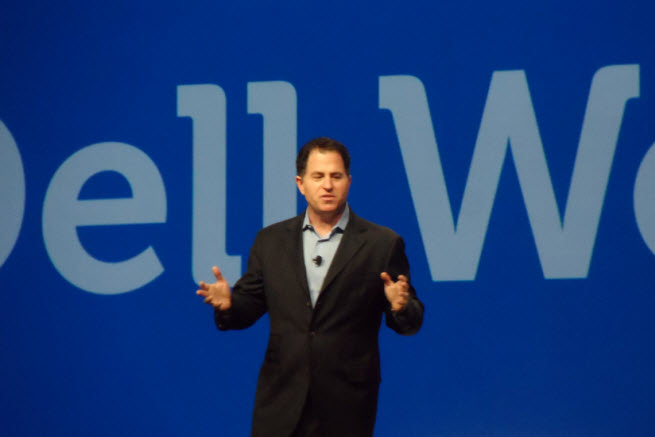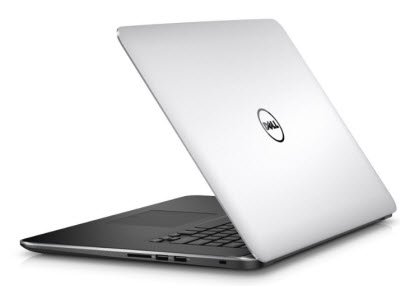VB: I can see different reasons for the timing here. I would think that going private helps with spending more on something like research than the company has done historically. It also seems like we’re at a transition point in the market as we go from PCs to smartphones and tablets, where the dominant Windows architecture is no longer necessarily going to drive a technology monoculture. You need to experiment with different platforms, more with things like what Dell’s Alienware is doing with Steam Machines. It also seems like there’s more plain uncertainty as far as what technology is going to be the next big thing.
Menon: You hit the nail on the head. The timing is right for all kinds of reasons. Going private says, “Hey, we can start to focus on the long term now.” It enables us to focus on the future. But the other points you make are good ones.
That’s why we’re looking at disruptive trends and creating what we call the Dell technology outlook. This is not, as it might have been in the past, a Microsoft or an Intel outlook, or even a university outlook or some other smart people’s outlook. It’s a Dell outlook, led by Dell Research. It’s our view of trends, and there are many that we’re very interested in getting Dell ahead of the curve on.
Some of these trends are from a consumer perspective. Some are from an enterprise perspective. But these are things that will change the way our customers will work and play. There’s a lot of fascinating directions and research to be done around taking BYOD, for example, to the next level. If I draw two axes and think about security as one axis and productivity as the other–A lot of the focus of BYOD has been about security. As we get that under control, the next step for what we’ll need to do is deliver ease of use and productivity along with security. We don’t want to hinder your ability to do things.
VB: What are the trends you’re focused on?
Menon: As you move around a campus with your smartphone or your tablet or your laptop, you want to be able to seamlessly move from Sprint to AT&T to somebody else depending on signal strength. You want to automatically switch to wi-fi as it’s available, whether you’re in a university campus or a hospital or wherever. A lot of things will make this seamless as we go forward.
The whole notion of managing data, being able to get at your data whether it’s from your Microsoft phone or your Apple tablet or your Android phone, all of which I happen to have—That’s not very seamless today. We need to move toward data management. It’s about getting at your data, not so much about managing your device.
A number of things in that space are exciting. As you move to the cloud and put more things in the cloud, the issues around security—some really interesting technologies will move security. If I want to use a cloud service provider today to do my taxes for me, there are things like PLF, like perfect forward secrecy, that have multiple keys to protect your data. One of those keys is constantly changing, so even if someone gets the keys, they’re only valid for a short period of time.
But we still have issues around the service provider. Let’s say I’m doing my taxes. The person doing those taxes still gets to see private information about me — my salary, what I have to send to the IRS. There is technology that will make it possible for me to send encrypted data to the tax provider. I’ll have the provider do all their computation on encrypted data. They’ll send me back encrypted data, and never see anything about me directly. Encryption technologies like homomorphic encryption are areas we want to study, because we think they’ll be very important to our customers going forward.
VB: Security is big?
Menon: We have a lot of interesting research in the security area around context-aware security, the notion that—today it’s a sort of yes/no. Depending on your role in administration, either you can get into a system or you can’t. Tomorrow it’s going to have to be based on not just your role, but also where you’re accessing from, what device you’re using, what operating system is running on that device, the threat level on a given day, and the business context. Did I just sign an agreement between companies A and B? Is that why a bunch of data is moving through me? This sort of context-aware adaptive security is another area we’re interested in pursuing.
We all know that flash memory has made a lot of penetration, both with consumers and in the enterprise. Increasingly, we’re seeing diskless laptops, diskless tablets. Even in the enterprise area, we’re seeing flash change the way that we can support our customers. Next-generation stuff in coming in the next few years that will allow flash—it’s flash-like, but I think of it as next-generation flash. It’s 50 to 100 times faster than today’s flash, almost as fast as memory, and maybe a fifth of the price.
All of a sudden, you can do things with that technology in terms of realtime data analytics. If you’re buying a prescription, the pharmacist has a very short time to find all the contraindications and interactions in the drugs they’re handing to you. Some of this technology is going to enable all kinds of quick analytics that weren’t possible before. How can we take advantage of these new technologies as they become available for Dell? These are the kinds of things that the research group is excited about.
VB: Historically, R&D is often associated with platform owners. In Dell’s case, it hasn’t been a platform owner. Does Dell do a different kind of R&D because of that? Does it chew off less than what some of the larger tech companies are doing for very broad-based R&D?
Menon: Particularly with the new Dell software group, Dell does own platforms. We own platforms in systems management, and as we get into the data analytics space. We have firewall products and that kind of thing. Enterprise-wide, I would say that we do own platforms in that sense.
From a consumer point of view, there’s increasing ability to do interesting research, largely driven by the move from desktop apps to software as a service. If I think about anything that runs on a PC today, for every example of a desktop app, I can give you a corresponding software as a service app. Office is going to Office 365 or Google apps. Email is going to Gmail. Accounting is going to Quickbooks Online. Databases are going to Google apps. Photo editing is going to PICnet or PicMonkey. Adobe has Creative Cloud. Some of the value is shifting as far as the kinds of things that you’re able to do.
To the earlier point about managing data for the consumer on the PC or the laptop and integrating that with managing data on the server, there are real opportunities. But I would also say that our close relationships with Intel and other partners are obviously very helpful to us. We’re not going to be able to do the deep research in terms of the next generation of chips. By selecting partners in these areas and expanding road maps regarding where these technologies are going – what’s happening with CPUs, with memory – we can use that to leverage our research and drive solutions that can take advantage of those new technologies.
VB: How are you going to spread out your research? You have a lot of operations in Texas, but also a presence out here in California as well. Where will you do your work?
Menon: For the organic part of our research, we’re splitting it between Austin and the bay area. We have a huge presence in Austin, and then a pretty big presence in the bay when you think about all the companies we’ve acquired over the last few years, between Force 10 and Wyse and Ocarina and SonicWALL and so on. That bay area vitality is important to us.
From a university perspective, we have a list of schools we’re working with in all kinds of geographies. We’re also spreading out to particular parts of where Dell has presence — China, India, and other locations where we have R&D teams already. We are expanding to people in those locations that have an interest in working with Dell Research.
VentureBeat's mission is to be a digital town square for technical decision-makers to gain knowledge about transformative enterprise technology and transact. Learn More







![Reblog this post [with Zemanta]](http://img.zemanta.com/reblog_e.png?x-id=5bfeec16-0174-4565-a7d8-3f9d409c0947)
